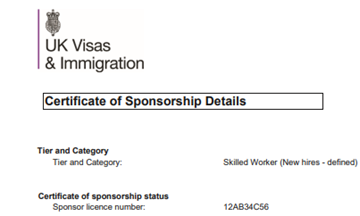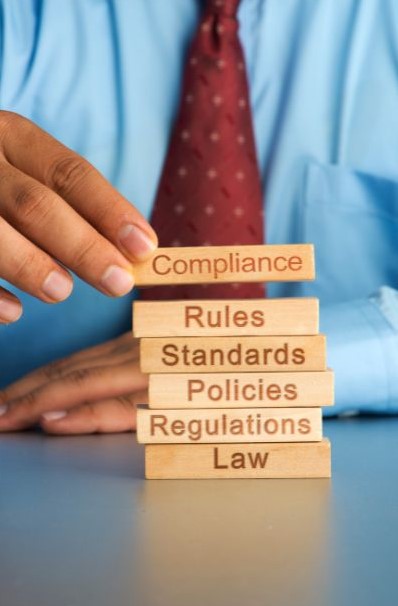How Much Does a UK Sponsor Licence Cost in 2026? (All Fees Explained)
Why is this so confusing – and expensive?

You’ve finally found the right candidate. Someone with the right skills and experience, but they need visa sponsorship. Or maybe you're expanding your workforce and the right person for the job isn’t already settled in the UK. You’ve been told you’ll need a UK sponsor licence, and you’ve started digging around online to figure out what it costs.
But instead of finding clear answers, you’ve stumbled into a maze of jargon, different fees, rules about company size, and warnings about non-compliance. The costs don’t seem to stop at the application stage, and you’re worried you might be walking into a black hole of expenses.
We get it. You’re not alone. Business owners, HR professionals and directors come to us every day, frustrated by how unclear this process seems. They want to do things properly, but they also want to know what it’s going to cost, not just now, but across the full lifecycle of sponsoring an employee.
At Immtell, immigration is what we do, and we know this system inside out. In this guide, we’ll give you the full breakdown of Home Office sponsorship licence costs in 2026. Not just the application fee, but everything else you need to know, with plain-English explanations and practical examples. By the end, you’ll have a clear picture of what you’ll pay, when, and why.
What Is a Home Office Sponsor Licence?
A UK sponsorship licence is official permission from the Home Office that allows you to legally employ someone from outside the UK and Ireland who doesn’t already have permission to work here. It’s a licence to hire global talent.
There are two main types:
- A Worker sponsor licence, used to sponsor people for longer-term roles under routes like the Skilled Worker visa or the Senior or Specialist Worker visa.
- A Temporary Worker sponsor licence, used for shorter-term roles such as interns, creatives, religious workers, or those on exchange schemes.
Depending on your hiring needs, you can apply for either one or both together.
Once approved, you gain access to an online system called the Sponsor Management System (SMS), where you can issue Certificates of Sponsorship (Cos) for the workers you want to employ. Without a licence, you can’t legally sponsor anyone, no matter how qualified they are.
Who Needs a Home Office Sponsorship Licence and Why?
You’ll need a Home Office sponsor licence if you want to employ someone from overseas who doesn’t already have a visa or permission that lets them work in the UK.
Examples include:
- Hiring a civil engineer from India on a Skilled Worker visa
- Bringing in a marine technician from the US under the Secondment Worker route
- Employing a South Korean intern through a Government Authorised Exchange scheme
Without a sponsorship licence, you cannot legally employ that person, and doing so anyway can lead to fines, reputational damage, and even criminal sanctions.
Getting a Home Office sponsor licence isn’t just about paperwork. It’s about making sure your business is legally equipped to access global talent.
How Much Does a UK Sponsor Licence Cost in 2026?
The fee you’ll pay for your sponsor licence depends on two things:
- The type of licence you apply for
- The size of your organisation
Here are the current government fees:
Type of Licence |
Fee for Small or Charitable Sponsors |
Fee for Medium or Large Sponsors |
|---|---|---|
| Worker | £574 | £1,579 |
| Temporary Worker | £574 | £574 |
| Worker and Temporary Worker | £574 | £1,579 |
If you apply for both licence types together, the cost remains the same – you won’t be charged twice.
What Counts as a Small or Large Sponsor?
This is one of the most misunderstood areas in the entire sponsor licence process.
You are classed as a small sponsor if two or more of the following apply:
- Your annual turnover is £15 million or less
- Your total assets are £7.5 million or less
- You have 50 or fewer employees
You’re also considered a small sponsor if you’re a charitable organisation, such as a registered charity or exempt charity.
If you don’t meet these thresholds, you're treated as a medium or large sponsor – even if you’re only applying to sponsor a single person. The difference in cost between these categories is significant, so it’s important to assess your status correctly before you apply.
Beyond the Home Office Sponsorship Licence: What Else Do You Pay?
The Home Office sponsor licence fee is only the beginning. Once you’ve secured your sponsorship licence, you’ll face additional charges for each worker you sponsor.
Certificate of Sponsorship (CoS)
Each sponsored employee needs a CoS. It’s a digital document confirming that you’re sponsoring them for a role that meets the visa requirements. Think of it like an online work permit.
- For most Worker visas: £525
- For most Temporary Worker visas: £55
This is a per-person, per-use cost. If someone changes roles, extends their visa, or switches routes, you will usually need to assign a new Certificate of Sponsorship (Cos) and pay again. You'll also need to pay for a new CoS if you make significant errors on the CoS, refunds are not provided if you have to withdraw, so be careful or seek advice.
Immigration Skills Charge (ISC)
If you’re sponsoring someone under the Skilled Worker route (or similar), you’ll also need to pay the Immigration Skills Charge.
The amount depends on your company size and how long the person will be working for you.
- Small or charitable sponsors: £480 for the first year, and £240 for each additional 6 months
- Medium or large sponsors: £1,320 for the first year, and £660 for each additional 6 months
For example, sponsoring a worker for three years would cost:
- £1,440 for a small or charitable sponsor
- £3,960 for a medium or large sponsor
This is paid upfront when you assign the CoS and is in addition to the CoS fee.

Other Costs That Catch Employers Out
Even when you’ve accounted for the licence fee, the CoS cost, and the Immigration Skills Charge, other potential expenses often catch employers off guard. Some are optional, but many become necessary depending on how your Home Office sponsorship licence application or ongoing sponsorship needs unfold.
Application Priority Processing
One of the most common additional costs is the Home Office’s priority processing service, which allows you to fast-track your sponsor licence application. For a £750 fee, the processing time can be reduced from the standard six to eight weeks to 10 working days. That speed can be critical for businesses needing to bring someone in quickly, but there are caveats.
There is a daily cap on the number of priority requests that can be accepted, and they fill up very quickly. At Immtell, we help clients secure one as soon as slots open, but it’s not always guaranteed. And if the Home Office later flags your application for a compliance check, which they are doing more frequently, your application will be paused and reviewed. These “compliance checks” are essentially online pre-licence audits, and they delay your application regardless of whether you’ve paid for priority. Unfortunately, the £750 fee is not refundable if this happens.
These checks are becoming more common as the Home Office shifts towards tighter enforcement. They typically involve submitting evidence of your HR policies, record-keeping, and sponsor duties – all things we support clients with as part of their application.
Specialist Legal Support
Due to the growing complexity of these applications, many businesses choose to invest in end-to-end support. Our Home Office sponsor licence application support fixed-fee typically ranges between £4,500 and £6,500 + VAT, depending on the complexity of your business. Factors that influence this include the number of UK sites or offices, whether there are overseas branches or linked entities involved, your internal HR systems, and the level of preparation needed for potential Home Office scrutiny.
Once your Home Office sponsorship licence is granted, you’ll then move into the Certificate of Sponsorship (CoS) stage. While it’s technically possible to manage this in-house, many employers prefer to outsource this responsibility. It’s easy to get wrong, and if you do, the CoS fee is non-refundable, even if the certificate is cancelled or unused. A minor error in the job code, salary, or visa type can result in a visa refusal, causing frustration, increased costs and delays for both the employer and the employee.
That’s why most of our clients continue working with us after their sponsor licence has been granted to handle the CoS stage accurately and efficiently. However, to do this, we often need to be added to the Sponsor Management System (SMS). The level of access we require depends on the location of the worker:
If the worker is already in the UK, we usually only need Level 2 access, which is quicker to set up, and no additional costs are required.
If the worker is applying from outside the UK, we must be added as both your legal representative and a Level 1 user – a more complex process that can take up to 16 weeks without prioritisation.
To avoid delays, many sponsors choose to pay for the Home Office’s priority processing for Level 1 user requests, which is currently £350 per request. If we’re added as both representative and Level 1 user, the cost is usually £700, and this is also subject to the Home Office’s daily cap. Unlike many providers, we include this as part of our fixed-fee sponsor licence application service, so there are no surprise extras.
Support for the CoS and the visa application are charged separately. Our fee varies depending on whether you're sponsoring one person or multiple people, and whether we’re also handling the visa application. For businesses that sponsor at scale, fees start at £500 + VAT. For one-off or more involved cases, this can be £1,100 + VAT or more. If we’re managing both the CoS and visa application, most clients pay between £1,700 and £2,500 + VAT, with £2,200 + VAT being the most typical all-in cost for that support.
We aim to be fully transparent from the start. These costs help avoid wasted certificates, rejected applications, and the stress of navigating unfamiliar systems under pressure. And most importantly, they give your business the confidence to get on with growth, knowing we’ve got the compliance side covered.
Common Cost Mistakes We See (And Help Avoid)
One of the most expensive things we see is companies applying as a large sponsor when they actually meet the criteria to be classified as small. It might seem like a minor error, but it can increase the Immigration Skills Charge by nearly 200%, resulting in thousands of pounds being lost unnecessarily.
Another issue is companies sponsoring workers who don’t actually meet the visa requirements. Maybe the job title isn’t on the eligible list, or the salary doesn’t meet the required threshold. The result? The visa application gets refused, the CoS fee is wasted, and the company has to start again.
Other businesses get caught out by failing to meet sponsor duties, for example, not reporting employee changes, not updating contact details, or missing visa expiry dates. These slip-ups can result in Home Office action, and in some cases, the licence being suspended or revoked. That often leads to lost staff, legal fees, and damage to their reputation.
All of these issues can be avoided with the right support early on.
Is the Home Office Sponsor Licence Worth the Investment?
Yes – when it’s used properly, a Home Office sponsorship licence is a valuable business asset.
In sectors where talent shortages are real, like engineering, construction, care, tech, and manufacturing, being able to access the global workforce gives you a significant advantage.
The actual cost of sponsoring someone may be £5,000 to £8,000, depending on the visa length and the benefits you offer. But when you consider the cost of leaving a role unfilled, slowing delivery, or turning down contracts, the licence becomes a smart investment.
And because you no longer need to renew it, the cost-per-hire continues to drop as you scale your use of the sponsor licence.
How Immtell Helps You Get It Right (Without Overpaying)
We support businesses across the UK with every stage of the Home Office sponsorship process, from first-time sponsor licence applications to long-term sponsor management.
We offer:
- Fixed-fee licence support, so you know the cost upfront
- Mock audits and compliance reviews
- Sponsor training and policy templates
- Access to our “Audit-Ready Authority Blueprint” and “Compliance Confidence Compass” for businesses that want deeper support.
Final Thoughts
Home Office sponsor licences aren’t free, but they don’t need to be a financial black hole either. When you understand the fees, plan, and work with experienced professionals, the costs become manageable, and the benefits speak for themselves.
If you’re ready to take the next step or just want a clear roadmap, we’re here to help.
Get in touch today, and let’s help you hire the people your business needs, wherever they’re from.

About the Author
Gavin Webster is the Director of Immtell, a UK immigration and global mobility consultancy that helps businesses navigate sponsor licensing, workforce compliance, and strategic international hiring. With a career spanning over 23 years in both government and private sectors, Gavin offers a rare and trusted perspective that combines deep operational insight with practical business sense.
Unique Home Office Perspective
He began his immigration journey on the front line working at the UK’s ports of entry as an immigration officer, later moving into enforcement, and then representing the UK as a visa officer at diplomatic posts across Africa. After returning to the UK, Gavin spent several years as a Home Office compliance officer, conducting sponsor audits and working directly with employers to assess and enforce their obligations.
In total, Gavin spent over 13 years working inside the Home Office, gaining firsthand experience of how immigration policy is developed, applied, and enforced, and more importantly, where businesses often fall short.
'Big 4' Problem Solving
In 2016, he moved into the private sector, joining two of the Big 4, EY and PwC, which spun off to form Vialto Partners, where he advised multinationals and high-growth businesses on how to manage global mobility effectively, meet their compliance duties, and build immigration strategies that supported scale and speed. His experience advising across sectors from healthcare to tech led to the launch of Immtell, created to offer employers straightforward, expert-led support with immigration and mobility.
Today, Gavin works with corporates, SMEs, and organisations that need clarity and confidence when hiring international talent. His expertise spans the full lifecycle of sponsorship from applying for a Home Office sponsorship licence through to CoS management, visa support, staff training, and audit preparation.
Complex Sponsor Licence Support
For one healthcare provider struggling with internal disorganisation and escalating Home Office scrutiny, Gavin restructured their sponsorship systems, trained their HR leads, and introduced a compliant process for tracking and reporting. The result was a 40% reduction in visa processing delays and a renewed A-rated sponsor status that allowed them to continue growing their care team.
Local Expertise
Through Immtell, Gavin also partners with a trusted network of global experts to offer broader mobility solutions, including relocation support, business travel and compliance advice, and long-term workforce planning. His work is underpinned by a clear, collaborative approach, shaped by years of seeing where real risks, and real opportunities lie.
Helping a Tech Startup Scale...Fast
In one case, a fast-growing tech startup facing a mission-critical talent gap approached Immtell with an urgent need to sponsor overseas engineers. Gavin helped secure their Home Office sponsor licence, trained the internal team, and supported the preparation and assignment of 15 Skilled Worker visas, all within three months. This allowed the company to hit key project milestones without compromising timelines or compliance,
Whether resolving complex compliance issues, guiding first-time sponsors, or helping scale global mobility programmes, Gavin’s role is consistent: to act as a steady, strategic partner who makes immigration work for the business, not the other way around.
Download Your Free Home Office Sponsor Duties Guide
Are you confident your business fully understands and meets its Home Office sponsor duties? Avoid costly compliance mistakes and stay ahead of government requirements with our comprehensive, easy-to-follow Sponsor Duties Guide.
Get practical insights and step-by-step advice to help you:
- Understand the sponsor licence "key personnel" requirements and duties
- Maintain your sponsor licence compliance
- Prepare for Home Office audits
- Streamline your sponsorship processes
- Support your international workforce effectively
Download the guide now—no strings attached, and take the first step toward peace of mind and confident global hiring.
Let’s Connect
If you’re seeking an immigration partner with a full suite of global mobility support, Gavin is here to help. Contact him on LinkedIn, email gavin@immtell.com or +44(0) 7764 789036 for guidance tailored to your goals.


Ready to Apply for Your Sponsor Licence?
Our team provides hands-on assistance to complete your application accurately and on time, helping you unlock access to international talent faster.
Our team provides hands-on assistance to complete your application accurately and on time, helping you unlock access to international talent faster.












